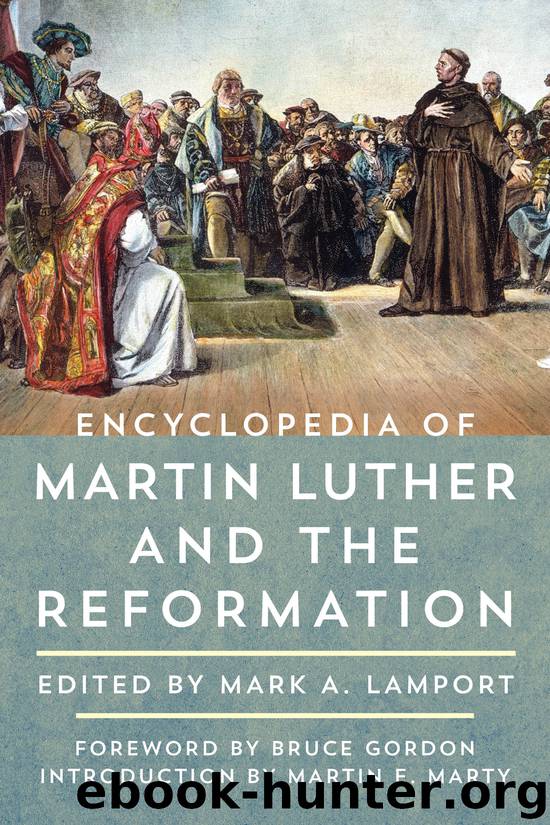Encyclopedia of Martin Luther and the Reformation by Mark A. Lamport

Author:Mark A. Lamport
Language: eng
Format: epub
ISBN: 9781442271593
Publisher: Rowman & Littlefield Publishers
Published: 2017-03-16T04:00:00+00:00
Martin Luther memorial in Erfurt, Germany
In the introduction to a study about Lutheran heritage in the Nordic countries, the researchers write “that it is hard to detect a shared understanding between and within the Churches in the study on what it means to be Lutheran” (Exploring a Heritage 2012, 43).
References and Resources
The Apology of the Augsburg Confession. 1982. Die Bekenntnis schriftender evangelisch-lutherischen Kirche, 15:44. Göttingen, Germany: Vandenhoeck & Ruprecht.
Exploring a Heritage: Evangelical Lutheran Churches in the North. 2012. Edited by Anne-Louise Eriksson, Göran Gunner, and Niclas Blåder. Church of Sweden Research Series no. 5. Eugene, OR: Pickwick Publications.
Hauschild, Wolf-Dieter, and Norman Hjelm. 2003. “Lutheranism.” In The Encyclopedia of Christianity, edited by Erwin Fahlbusch and G. W. Bromiley et al., 3:262–269. Grand Rapids, MI: Eerdmans.
The Identity of the Church and Its Service to the Whole Human Being. 1970. Vols. 1–2. Geneva: Lutheran World Federation.
Kuusniemi, Kalle. 2015. The Voice of Confessionalism and Inter-Lutheran Relations: The Influence of the Missouri Synod in the Baltic and Ingrian Lutheran Churches, 1991–2001. Helsinki: University of Helsinki.
Lutheran World Federation. n.d. Home page. Accessed November 27, 2016. https://www.lutheranworld.org/.
Seils, Michael. 1988. Lutheran Convergence? An Analysis of the Lutheran Responses to the Convergence Document “Baptism, Eucharist and Ministry” of the World Council of Churches Faith and Order Commission. LWF Report 25. Geneva: Lutheran World Federation.
Senn, Frank C. 2008. Lutheran Identity: A Classical Understanding. Minneapolis, MN: Augsburg Fortress
Wadensjö, Bengt. 1970. Toward a World Lutheran Communion: Developments in Lutheran Cooperation up to 1929. Studia Historico-Ecclesiastica Upsaliensia 18. Uppsala, Sweden: Acta Universitatis Upsaliensis.
—Sven-Erik Brodd
The Apology of the Augsburg Confession. 1982. Die Bekenntnis schriftender evangelisch-lutherischen Kirche, 15:44. Göttingen, Germany: Vandenhoeck & Ruprecht.
Exploring a Heritage: Evangelical Lutheran Churches in the North. 2012. Edited by Anne-Louise Eriksson, Göran Gunner, and Niclas Blåder. Church of Sweden Research Series no. 5. Eugene, OR: Pickwick Publications.
Hauschild, Wolf-Dieter, and Norman Hjelm. 2003. “Lutheranism.” In The Encyclopedia of Christianity, edited by Erwin Fahlbusch and G. W. Bromiley et al., 3:262–269. Grand Rapids, MI: Eerdmans.
The Identity of the Church and Its Service to the Whole Human Being. 1970. Vols. 1–2. Geneva: Lutheran World Federation.
Kuusniemi, Kalle. 2015. The Voice of Confessionalism and Inter-Lutheran Relations: The Influence of the Missouri Synod in the Baltic and Ingrian Lutheran Churches, 1991–2001. Helsinki: University of Helsinki.
Lutheran World Federation. n.d. Home page. Accessed November 27, 2016. https://www.lutheranworld.org/.
Seils, Michael. 1988. Lutheran Convergence? An Analysis of the Lutheran Responses to the Convergence Document “Baptism, Eucharist and Ministry” of the World Council of Churches Faith and Order Commission. LWF Report 25. Geneva: Lutheran World Federation.
Senn, Frank C. 2008. Lutheran Identity: A Classical Understanding. Minneapolis, MN: Augsburg Fortress
Wadensjö, Bengt. 1970. Toward a World Lutheran Communion: Developments in Lutheran Cooperation up to 1929. Studia Historico-Ecclesiastica Upsaliensia 18. Uppsala, Sweden: Acta Universitatis Upsaliensis.
—Sven-Erik Brodd
Lutheranism and Public Education in European Lutheran Countries
Lutheranism not only changed the understanding of the gospel and the churches, it also entailed a great improvement to education at all levels in the Lutheran territories of Europe in the 16th century.
Martin Luther
In the Middle Ages all education in Western Europe had been based on the Christian faith and had been provided by church schools and monasteries.
Download
This site does not store any files on its server. We only index and link to content provided by other sites. Please contact the content providers to delete copyright contents if any and email us, we'll remove relevant links or contents immediately.
The Gnostic Gospels by Pagels Elaine(2527)
Jesus by Paul Johnson(2352)
Devil, The by Almond Philip C(2324)
The Nativity by Geza Vermes(2226)
The Psychedelic Gospels: The Secret History of Hallucinogens in Christianity by Jerry B. Brown(2149)
Forensics by Val McDermid(2088)
Going Clear: Scientology, Hollywood, and the Prison of Belief by Lawrence Wright(1977)
Going Clear by Lawrence Wright(1962)
Barking to the Choir by Gregory Boyle(1819)
Old Testament History by John H. Sailhamer(1809)
Augustine: Conversions to Confessions by Robin Lane Fox(1769)
The Early Centuries - Byzantium 01 by John Julius Norwich(1736)
A History of the Franks by Gregory of Tours(1720)
A Prophet with Honor by William C. Martin(1717)
Dark Mysteries of the Vatican by H. Paul Jeffers(1707)
The Bible Doesn't Say That by Dr. Joel M. Hoffman(1676)
by Christianity & Islam(1627)
The First Crusade by Thomas Asbridge(1601)
The Amish by Steven M. Nolt(1563)
